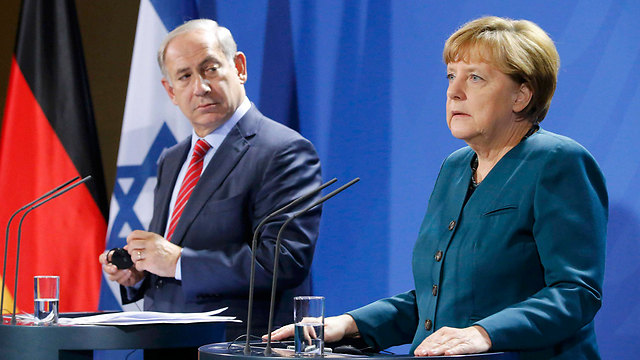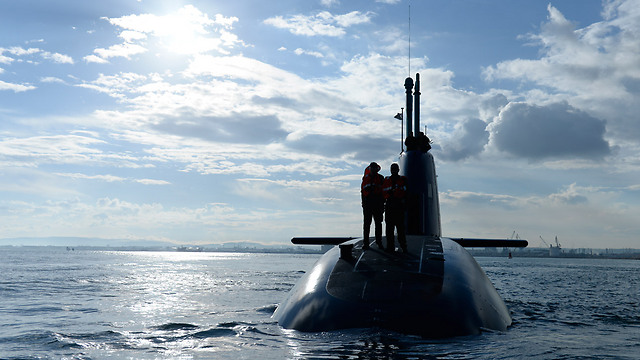
German-Israel military cooperation despite political kerfuffle
Although relations between the offices of Merkel and Netanyahu are strained, the security relationship with Germany is Israel's most important after the US.
The Israeli-German relationship experienced problems over the weekend as it ran over a political pothole. The German weekly Der Spiegel published that the German government was weighing the possibility of withdrawing from Chancellor Angela Merkel's obligations to maintain Israel's security and right to exist as Germany's top priority.
Senior politicians from the governing parties told the weekly that the German government has the impression that Israeli Prime Minister Benjamin Netanyahu is taking advantage of Germany's obligations to Israel and that his government's current policies in the West Bank are making finding a solution to the Israeli-Palestinian conflict more difficult without contributing to the preservation of Israel's Jewish and democratic character.
Even 71 years after the Second World War, any damage such as this in relations is overly charged. For all these years, with the cloud of history hovering above, Germany has taken pains to fund a significant portion of Israel's security expenditures.
In exchange for its financial contributions, the German government apparently expected to receive better treatment by Netanyahu and a larger influence on his policies. According to Der Spiegel, it did not receive this.
Submarines, ships, missiles—and guilt
Just a fortnight ago, a new peak was reached in German-Israeli security relations: the commander of the Israeli Air Force (IAF), Maj. Gen. Amir Eshel, received an extraordinary honor from Berlin when he was awarded the Bundeswehr Gold Cross of Honor from the German ambassador to Israel, Dr. Clemens von Goetze, and the commander of German Air Force Inspector Gen. Karl Müllner. According to an IAF statement, the ambassador stated when awarding the medal, "Our two air forces operate more closely and in a more trustful way than ever in times characterized by normal security challenges."
Beneath the diplomatic statements and against the background of the political tension between Merkel and Netanyahu's offices as revealed over the weekend, the medal revealed a small amount of Israel's most important security relationship with a foreign country besides the United States.
Germany (then West Germany) and Israel's security relationship began in the 50s, largely against the background of and following processes that led to the Reparations Agreement. Initially, these relations were kept secret, and only after the establishment of official diplomatic relations in 1965 did they become public.
Over the years, these relations included the exchange of military information and providing weapons, principally, but not exclusively, from Germany to Israel. In recent years, the trend of Israeli weapon sales to the German army, particularly to the air force, has grown. This trend included the leasing last year of enormous Eitan drones to Germany in the amount of millions of dollars.
Thus it was last year when the deal to purchase four German patrol ships by the Israeli Navy was signed, at a price of 1.8 million shekels, a third funded by Germany. These are the largest, most powerful and most advanced warships in the IDF's fleet. Officially, their objective is defending the gas rigs, but, in practice, the Navy can apparently use them for a variety of defensive and offensive purposes, both in times of war and peace.
The Navy of course received an additional, significant piece of German industry: the submarine fleet that it controls today. This consists of five submarines, three of which are the relatively older Dolphin model, received at the end of the 1990s and beginning of the 2000s. Two additional submarines were added in the last year—the INS Tanin and INS Rahav—at a cost of half a billion dollars each. The two of them are more than ten times more stealthy underwater than their predecessors. In another three years, a sixth German submarine is to join them.
In recent years, the European media have reported that Israeli companies were selling to Germany defense systems for airplanes in trilateral and quadrilateral deals with additional countries. According to foreign reports, one may add to those Germany's purchase of advanced Spike missiles, produced by Rafael Advanced Defense Systems, for use by local land forces.
Training together aerially
The security connection between the countries also includes operational knowledge. In the last decade, joint training by the IDF and the German armed forces has increased, particularly between the air forces, including joint fighter plane exercises over the Mediterranean. In the last year, it was even agreed for the first time that Israeli combat helicopter pilots would travel to Germany for training, which will include training on the German Tiger helicopters, and a reciprocal German delegation will undergo similar training on Israeli fighter helicopters.Sources in the IAF noted the importance of cooperation with Germany. Head of Helicopters Air Division Brig. Gen. Yaron Rozen stated last year on the IAF's website, "From an historic perspective, there is extraordinary importance to the very existence of cooperation, for professional meetings between the air forces and particularly for personal relationships between German officers and Israeli officers."
Maj. Ayalon of the Air Division added, "In recent years, the significant development of cooperation has begun, including joint learning at every level, squad exchanges, joint training and courses, operational dialogue, dialogue on topics of maintenance, and expanded dialogue on training issues."













